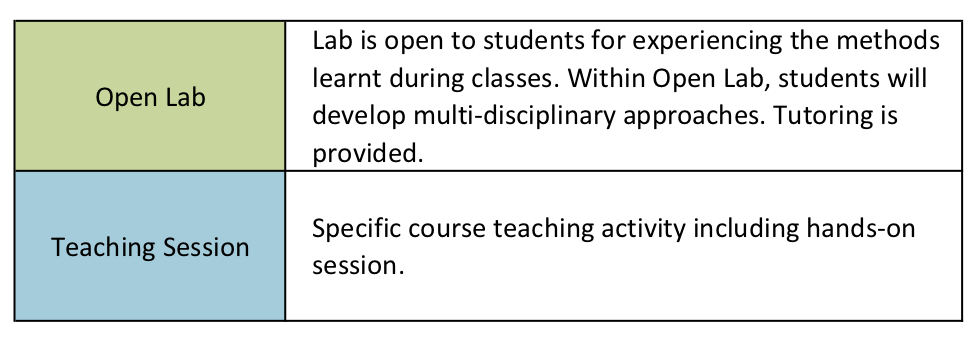Teaching 2015-2016
The Big Data Master is a full-time master delivered entirely online that starts in January and lasts one year. The teaching activity has two main phases: the first phase, that covers the period from November to end July, is dedicated to lectures and project activities; the second phase, that covers the period from August to December, is dedicated to a 475 hours Internship by the Partners.
The weekly teaching activity during the first phase is divided in lectures (wednesday to saturday) and lab hours (not mandatory) that allow student to experiment on the field the methods shown in the lectures with the support of the tutors. The steering committee has decided that at least 70% attendance of the lectures hours is required. The weekly teaching activity is described in the following images:


European Credit Transfer System (ECTS)
The European Credit Transfer System (ECTS) is the unit of measure of the volume of learning work, required to a student having an adeguated initial know-how, for acquiring the knowledge and abilities required by a teaching activity. It is equivalent to 25 hour of work, including lectures, individual studies and other types of activities (like internship). Each teaching activity has an associated number of credits, that are assigned after an exam.
The teaching activity is supported by the Moodle platform, where students will find all the teaching material.
Teaching 2015-2016
The objective of the module is to align the competences of the students in computer science and base, in particular about databases, structured data analysis and programming languages.
The module presents basic techniques for crawling/sensing big data from the Web. Students will learn how to crawl data from the Web,
rank crawled objects accordingly to their relevance, and enrich texts by using semantic-annotation tools.
The module aims to introduce ethical and legal notions of privacy, anonymity, transparency and discrimination, also referring the Directives and Regulations of the European Union and their ongoing evolution. Tho module will show Privacy-by-Design models and technologies that are useful to protect the users' rights and that allow the analysis of Big Data without harming the right to the protection of personal data, to transparency and to a fair treatment.
The module si composed by several Seminars on experiences and case- and use-studies of Big Data analytics and Social Mining from the SoBigData.eu labs and from the companies and institutions that are partners in the Master.
The module si composed by several Seminars on experiences and case- and use-studies of Big Data analytics and Social Mining from the SoBigData.eu labs and from the companies and institutions that are partners in the Master.
This module presentes techniques and methods for acquisition of Big Data from a large sources of data available, including mobile phone data, GPS data, customer purchase data, social network data, open and administrative data, environmental and personal sensor data. We discuss also several participatory methods for crowdsourcing or crowdsensing collection of data through ad hoc campains like serious games and viral diffusion.
The module aims to teach how to present the knowledge extracted from big data using multimedia story telling. It also shows some of the most recent and meaningful experiences of journalism and story telling based on quantitative information extracted from different data sources.
The module shows technologies and systems for accessing, managing and analysing Big Data for decision support. Technologies and analysis of problems are shown using examples and case studies in lab. The student will acquire skills on the main technologies for business intelligence and big data management, including data warehouse and online analytical processing technologies.
The module provides an introduction to base concepts of data mining and knowledge extraction process, introducing analytical models and algorithms for clustering, classification and pattern discovery, also referring Big Data sources.
The module aims to present the basic methods and techniques for the visualization and presentation of the information obtained from different sources: structured data (relational, hierarchical, trees), network data (social network), temporal data, spatial data and spatio-temporal data. Studying the existing methods and tools, some scenarios of visual analytics will be presented.
The aim of this course is to introduce the student with the high performance Big Data management tools. The student will gain expertise in the use od NO-SQL platforms for the analysis and mining of large data volumes, thus performing tasks that would not be feasible with traditional data bases.
The internship period is 300 hours, 12 CFU, that single student or a small group of students have to spend in one of the companies and institutions partner of the master, working on an agreed project and under the supervision of a team of tutors composed by the teachers of the master and the management companies.
At the end of the internship, the student has to write a thesis describing the work done, the methodologies used and the results of the internship activity. The thesis will be presented by the student in the final exam of the master. The evaluation of the thesis will be based on the quality of the document, on the analysis and synthesis capabilities shown by the student during the presentation.
Periodo Tirocino: September - December.
The purpose of the course is to introduce the main analysis techniques for spatio-temporal data, with a particular focus on human mobility (including vehicles), aimed to better understand the overall mobility of a territory. The presentation will be supported by several case studies developed with the SoBigData.eu laboratory.
This module introduces the main methods of analysis and mining of opinions and personal evaluations for users based on Big Data generated on the web or other sources. Emphasis will be put on text mining method applied to text originated on social media. Lessons will be supported by case studies developed in the SoBigData.eu lab.
This course introduces students to the theories, concepts and measures of Social Network Analysis (SNA), that is aimed at characterizing the structure of large-scale Online Social Networks (OSNs). The course presents both classroom teaching to introduce theoretical concepts, and hands-on computer work to apply the theory on real large-scale datasets obtained from OSNs like Facebook and Twitter. The course aims to discuss in particular how the structural properties of social networks can be analyzed through SNA techniques, and how these properties can be used to characterize social phenomena arising in the society.
This module presents how to analyse traces that users leave from querying Web search engines (query log). It presents the main applications of Web mining including: i) how to profile the interests/activities of users, ii) how to use information from query logs for forecasting social indicators and optimizing Web search engines. Teaching activities will be supported by several case studies developed in the SoBigData.eu laboratory.
The module aims to teach the software modules used to build a modern search engine and the analysis of the performance and the computational limits of the algorithmics solutions currently used in each of them. Practical and theoretical fundmentals for the organization and the analysis of IR systems.













